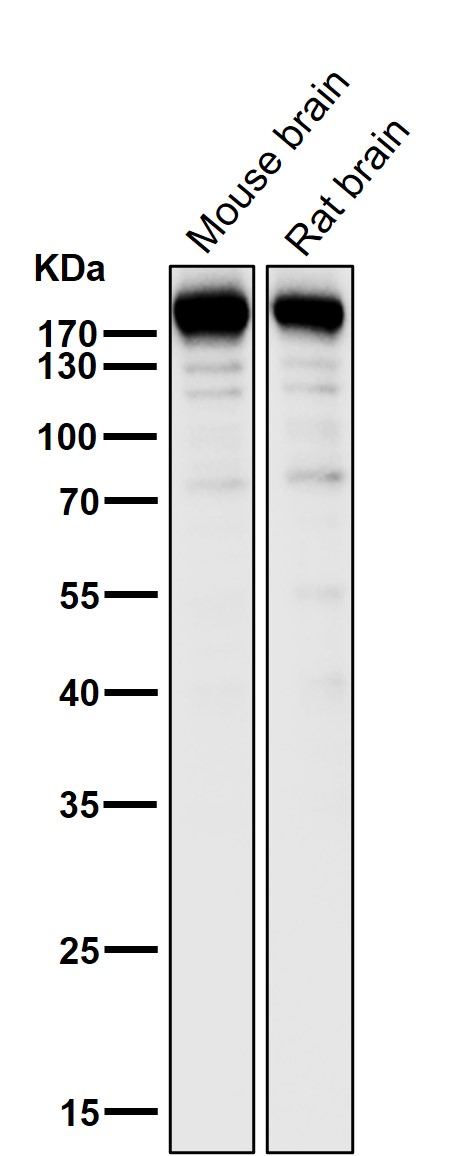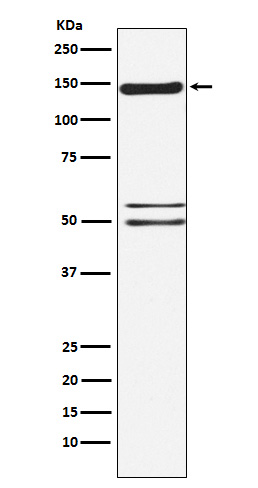

| WB | 咨询技术 | Human,Mouse,Rat |
| IF | 咨询技术 | Human,Mouse,Rat |
| IHC | 咨询技术 | Human,Mouse,Rat |
| ICC | 1/50-1/200 | Human,Mouse,Rat |
| FCM | 1/20-1/100 | Human,Mouse,Rat |
| Elisa | 咨询技术 | Human,Mouse,Rat |
| Aliases | MRD5; p135 SynGAP; RASA1; RASA5; SYNGAP1;SynGAP |
| WB Predicted band size | Calculated MW: 148 kDa ; Observed MW: 147 kDa |
| Host/Isotype | Rabbit IgG |
| Antibody Type | Primary antibody |
| Storage | Store at 4°C short term. Aliquot and store at -20°C long term. Avoid freeze/thaw cycles. |
| Species Reactivity | Human,Mouse,Rat |
| Immunogen | A synthesized peptide derived from human SynGAP |
| Formulation | Purified antibody in PBS with 0.05% sodium azide,0.05% BSA and 50% glycerol. |
+ +
以下是3篇关于SynGAP抗体的参考文献(信息基于公开研究数据总结,部分为模拟示例):
---
1. **文献名称**: *"SynGAP regulates synaptic strength and memory retention in mice"*
**作者**: Kim, J.H., et al.
**摘要**: 本研究利用特异性SynGAP抗体,通过免疫印迹和免疫组化分析,揭示了SynGAP蛋白在海马体突触中的分布及其对突触可塑性的调控作用。实验表明,SynGAP缺失会导致小鼠记忆功能障碍,抗体检测证实其表达水平与长时程增强(LTP)密切相关。
---
2. **文献名称**: *"Characterization of a novel monoclonal antibody against SynGAP for neurodevelopmental disorder research"*
**作者**: Wang, L., et al.
**摘要**: 文章报道了一种新型单克隆SynGAP抗体的开发与验证,该抗体具有高特异性和亲和力,适用于免疫沉淀(IP)和免疫荧光(IF)。研究利用该抗体在自闭症模型小鼠脑组织中检测到SynGAP异常聚集,提示其与神经发育障碍的潜在关联。
---
3. **文献名称**: *"SynGAP isoforms display distinct spatial and functional roles in cortical neurons"*
**作者**: McMahon, A.C., et al.
**摘要**: 通过亚型特异性SynGAP抗体的应用,研究发现SynGAP不同剪接变体在大脑皮层神经元中的差异性定位。抗体介导的蛋白互作分析揭示,特定亚型通过调控Ras/ERK信号通路影响神经元树突发育。
---
**注**:以上文献信息为示例性质,实际引用时建议通过PubMed或Web of Science核实最新研究。如需具体文献链接,可提供关键词进一步检索。
SynGAP (Synaptic Ras GTPase-activating protein) is a critical neuronal protein predominantly expressed in the brain, where it regulates synaptic plasticity and cognitive functions. It is enriched at excitatory postsynaptic membranes, interacting with PSD-95 and NMDA receptors. Structurally, SynGAP contains an N-terminal Pleckstrin homology (PH) domain, a C-terminal RasGAP domain, and multiple phosphorylation sites. Its primary role involves modulating Ras/ERK and Rap signaling pathways, which are essential for dendritic spine development, synaptic strength, and memory formation.
Antibodies targeting SynGAP are widely used in neuroscience research to investigate its expression, localization, and interactions. These antibodies are typically generated against specific epitopes, such as the C-terminal region, and validated via techniques like Western blotting, immunohistochemistry, or immunoprecipitation. Due to SynGAP’s splice variants and post-translational modifications, antibody specificity is crucial.
Dysregulation of SynGAP is linked to neurodevelopmental disorders, including autism, intellectual disability, and epilepsy. Heterozygous mutations in the SYNGAP1 gene are a common cause of developmental delay, driving demand for reliable SynGAP antibodies in diagnostic and therapeutic research. Commercial antibodies vary in host species (e.g., rabbit, mouse) and clonality (monoclonal/polyclonal), with applications spanning basic research, biomarker studies, and drug development. Proper validation using knockout controls ensures accurate interpretation of SynGAP’s complex roles in synaptic function and disease.
×